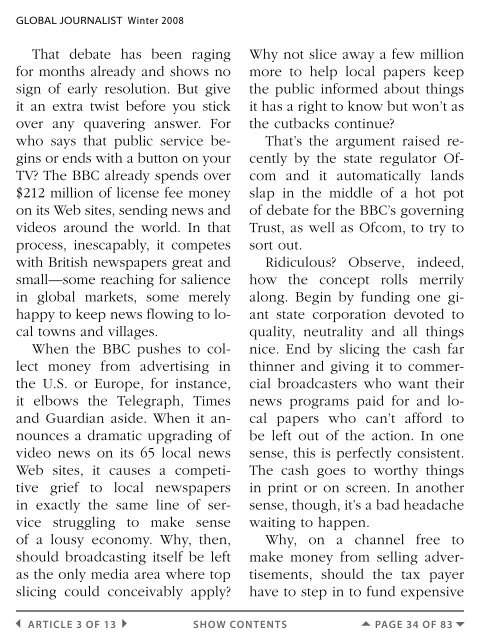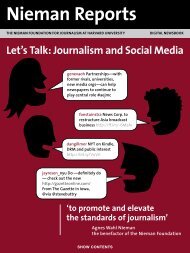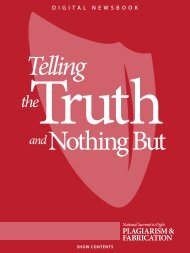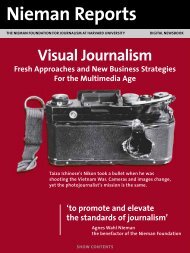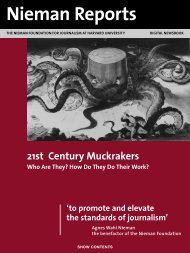Download - Global Journalist
Download - Global Journalist
Download - Global Journalist
Create successful ePaper yourself
Turn your PDF publications into a flip-book with our unique Google optimized e-Paper software.
GLOBAL JOURNALIST Winter 2008<br />
That debate has been raging<br />
for months already and shows no<br />
sign of early resolution. But give<br />
it an extra twist before you stick<br />
over any quavering answer. For<br />
who says that public service begins<br />
or ends with a button on your<br />
TV? The BBC already spends over<br />
$212 million of license fee money<br />
on its Web sites, sending news and<br />
videos around the world. In that<br />
process, inescapably, it competes<br />
with British newspapers great and<br />
small—some reaching for salience<br />
in global markets, some merely<br />
happy to keep news flowing to local<br />
towns and villages.<br />
When the BBC pushes to collect<br />
money from advertising in<br />
the U.S. or Europe, for instance,<br />
it elbows the Telegraph, Times<br />
and Guardian aside. When it announces<br />
a dramatic upgrading of<br />
video news on its 65 local news<br />
Web sites, it causes a competitive<br />
grief to local newspapers<br />
in exactly the same line of service<br />
struggling to make sense<br />
of a lousy economy. Why, then,<br />
should broadcasting itself be left<br />
as the only media area where top<br />
slicing could conceivably apply?<br />
Why not slice away a few million<br />
more to help local papers keep<br />
the public informed about things<br />
it has a right to know but won’t as<br />
the cutbacks continue?<br />
That’s the argument raised recently<br />
by the state regulator Ofcom<br />
and it automatically lands<br />
slap in the middle of a hot pot<br />
of debate for the BBC’s governing<br />
Trust, as well as Ofcom, to try to<br />
sort out.<br />
Ridiculous? Observe, indeed,<br />
how the concept rolls merrily<br />
along. Begin by funding one giant<br />
state corporation devoted to<br />
quality, neutrality and all things<br />
nice. End by slicing the cash far<br />
thinner and giving it to commercial<br />
broadcasters who want their<br />
news programs paid for and local<br />
papers who can’t afford to<br />
be left out of the action. In one<br />
sense, this is perfectly consistent.<br />
The cash goes to worthy things<br />
in print or on screen. In another<br />
sense, though, it’s a bad headache<br />
waiting to happen.<br />
Why, on a channel free to<br />
make money from selling advertisements,<br />
should the tax payer<br />
have to step in to fund expensive<br />
3 Article 3 of 134<br />
Show Contents<br />
5 Page 34 of 836


